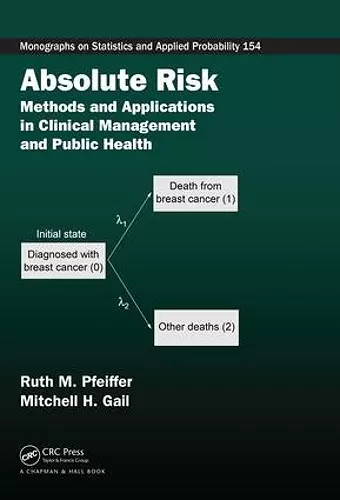Absolute Risk
Methods and Applications in Clinical Management and Public Health
Ruth M Pfeiffer author Mitchell H Gail author
Format:Hardback
Publisher:Taylor & Francis Inc
Published:26th Jul '17
Currently unavailable, and unfortunately no date known when it will be back
This hardback is available in another edition too:
- Paperback£49.99(9780367657819)

Absolute Risk: Methods and Applications in Clinical Management and Public Health provides theory and examples to demonstrate the importance of absolute risk in counseling patients, devising public health strategies, and clinical management. The book provides sufficient technical detail to allow statisticians, epidemiologists, and clinicians to build, test, and apply models of absolute risk.
Features:
- Provides theoretical basis for modeling absolute risk, including competing risks and cause-specific and cumulative incidence regression
- Discusses various sampling designs for estimating absolute risk and criteria to evaluate models
- Provides details on statistical inference for the various sampling designs
- Discusses criteria for evaluating risk models and comparing risk models, including both general criteria and problem-specific expected losses in well-defined clinical and public health applications
- Describes many applications encompassing both disease prevention and prognosis, and ranging from counseling individual patients, to clinical decision making, to assessing the impact of risk-based public health strategies
- Discusses model updating, family-based designs, dynamic projections, and other topics
Ruth M. Pfeiffer is a mathematical statistician and Fellow of the American Statistical Association, with interests in risk modeling, dimension reduction, and applications in epidemiology. She developed absolute risk models for breast cancer, colon cancer, melanoma, and second primary thyroid cancer following a childhood cancer diagnosis.
Mitchell H. Gail developed the widely used "Gail model" for projecting the absolute risk of invasive breast cancer. He is a medical statistician with interests in statistical methods and applications in epidemiology and molecular medicine. He is a member of the National Academy of Medicine and former President of the American Statistical Association.
Both are Senior Investigators in the Division of Cancer Epidemiology and Genetics, National Cancer Institute, National Institutes of Health.
"Written by two leading experts in the field, this book provides a comprehensive overview of absolute risk, including both theoretical basis and clinical implications before and after the disease diagnosis. Equipped with sufficient technical details on the estimation and inference of absolute risk aswell as a range of real examples, this book is targeted toward a broad audience, including epidemiologists, clinicians, and statisticians. While a few other books on theoretical aspects of absolute risk are available in the literature, the book by Pfeiffer and Gail treats absolute risk from several new angles . . ."
~Journal of the American Statistical Association
"The book by Pfeiffer and Gail leads us into the higher statistical levels of predicting the medical future. The main focus is on the concept of the absolute risk of an event because this has a clinically meaningful interpretation for the individual person. The much more commonly reported hazard ratios of health research do not provide a directly useful number for the single subject...The examples are about the real world (mostly cancer research), and the mathematics provide all the formula for building a well-calibrated absolute risk model and the validation study...The book contains a lot of material which is very difficult to find elsewhere, for example, on family studies, handling of missing data, and landmark analysis with time-dependent covariates. Overall, I found the book to provide a very complete documentation of a highly important subject. The authors are to be thanked for their thoroughness and congratulated for their work, which should be useful for many real-world applications of absolute risk."
~Biometrics
ISBN: 9781466561656
Dimensions: unknown
Weight: 612g
226 pages